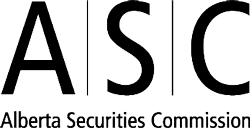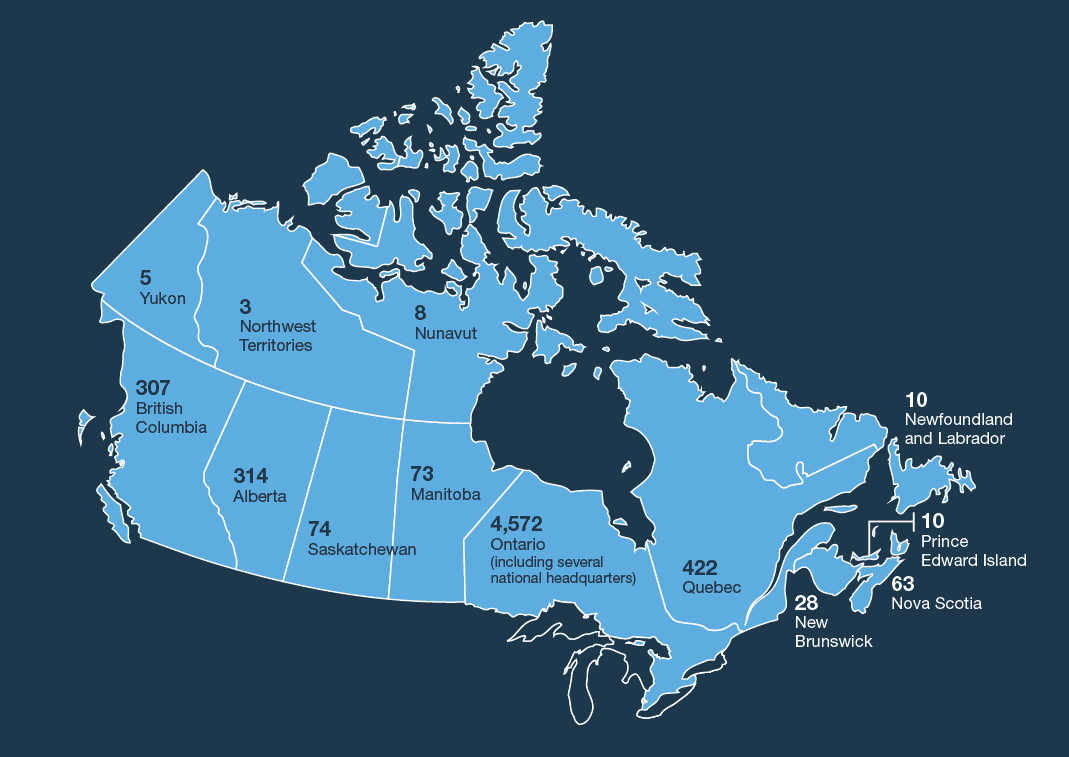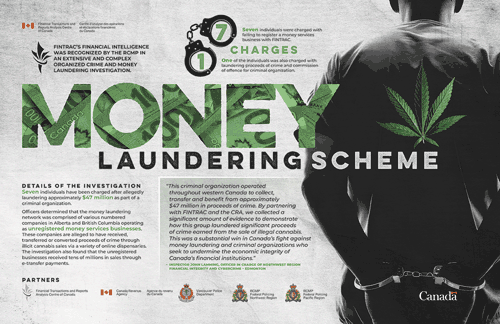2024–25 Annual Report
Safe Canadians, Secure Economy
On this page
Message from the Director and CEO

I am pleased to report on the critical work that FINTRAC carried out last year to combat money laundering, terrorist financing and sanctions evasion, and the tangible results that we achieved in helping to defend Canada and Canadians.
With a clear focus on our core operational mandate and our contributions to broader national priorities, we have helped to protect the safety of Canadians, particularly our most vulnerable citizens. We played a key role, for example, in the Government of Canada's enhanced commitment to combatting illegal fentanyl/illicit opioids. Between November 2024 and the end of March 2025, we generated more than 100 disclosures of actionable financial intelligence in support of law enforcement investigations related to illicit opioids. In early 2025, we were recognized by the Canadian Integrated Response to Organized Crime Committee for our contribution to a national sprint that led to the seizure of 46 kg of fentanyl, nearly 16,000 pills of fentanyl and other synthetic opioids, a large quantity of other drugs, 122 firearms and more than $800,000 in cash.
As part of the broader national effort to fight illegal fentanyl, we redeployed existing resources to establish a rapid intelligence production team to prioritize the disclosure of actionable financial intelligence related to illicit opioids and transnational criminal organizations. This team is focused on the production of financial intelligence in support of priority law enforcement investigations, including the Joint Intelligence Operational Cell, which is working to counter transnational organized crime, money laundering and drug trafficking. We also provided a financial crime expert to the office of Canada's Fentanyl Czar to support his efforts in tackling the illicit financing associated with illegal fentanyl.
Building on our work related to Project Guardian, a longstanding public-private partnership aimed at combatting money laundering related to fentanyl/illicit opioids, we mobilized our strategic intelligence efforts to identify and assess emerging characteristics, trends and tactics used by transnational criminals and cartels to launder the proceeds of drug trafficking, with a focus on illegal fentanyl. With this work, we helped inform law enforcement's efforts to detect and disrupt the financing of illegal fentanyl with our insight into the financial activities of illicit drug traffickers, underground banking channels and transactions involving precursor chemicals.
Throughout the year, we continued to leverage our longstanding collaboration with our counterparts in the United States and Mexico through the Illicit Finance Working Group, which is part of the North American Drug Dialogue, to develop money laundering indicators related to the importation, production and distribution of illegal synthetic opioids; share money laundering trends, typologies and best practices; and support law enforcement investigations.
As part of the national focus on combatting illegal fentanyl, we also helped businesses to identify and assess the money laundering risks associated with illicit opioids, apply measures to mitigate these risks, and report relevant transactions to FINTRAC. Following the listing of seven transnational criminal organizations as terrorist entities under the Criminal Code, we worked with businesses to update their processes and to ensure they submit reports regarding property held by listed persons or entities. We also shared new money laundering indicators related to illegal fentanyl/illicit opioids and toughened our oversight of businesses through targeted assessment actions and enhanced monitoring and enforcement activities. As a result of these efforts, reporting from businesses related to illegal fentanyl has increased.
Our contribution to Canada's fight against illegal fentanyl has demonstrated how effectively our full range of operations – our tactical financial intelligence, strategic intelligence and supervisory activities, all supported by modern technology – can be brought to bear to deliver on emerging national priorities.
Throughout 2024–25, our financial intelligence also assisted more broadly in investigations linked to money laundering, including in relation to human trafficking, fraud and auto theft, terrorist financing and threats to the security of Canada. With the information that we received from Canadian businesses, we generated more than 6,200 financial intelligence disclosure packages, based on more than 2,700 unique disclosures, in support of law enforcement and national security investigations across Canada and around the world. This is by far the largest number of disclosures that FINTRAC has generated in a single year.
Our actionable financial intelligence contributed to more than 200 complex, resource intensive (project level) investigations and many hundreds of other individual investigations at the municipal, provincial and federal levels across the country, and internationally. I was pleased to see that 96% of the feedback that we received from Canada's law enforcement and national security agencies indicated that our financial intelligence was actionable, including providing new leads, triggering new avenues of investigation or corroborating existing investigative information.
In March 2025, our financial intelligence was recognized by the Halton Regional Police Service in relation to a lengthy human trafficking investigation. Police alleged that the accused used coercion, manipulation, physical violence and psychological harm to maintain control and influence over their victims, while they benefitted financially from the exploitation. As a result of the investigation, two individuals were arrested and charged with more than 15 offences, including sexual assault, trafficking in persons and material benefits from trafficking in persons. Police also seized a quantity of cocaine, a large sum of cash and a stolen motorcycle. In its release, the Halton Regional Police Service stated that FINTRAC's financial information revealed that multiple women were being trafficked by these individuals.
Over the past year, our strategic financial intelligence helped inform Canada's security and intelligence community, regime partners and policy decision-makers, businesses, Canadians and international counterparts of the emerging methods used by criminals to launder money, fund terrorist activities and evade sanctions. We produced more than two dozen strategic financial intelligence assessments and reports covering key priority areas, including professional money laundering, sanctions evasion, terrorist activity financing, money laundering undertaken by domestic and international organized crime, and illicit drug trafficking, to improve the detection, prevention and deterrence of these criminal activities.
We also helped safeguard Canada's financial system and economy last year by ensuring that businesses comply with the Proceeds of Crime (Money Laundering) and Terrorist Financing Act (the Act) and associated Regulations. We are committed to working with businesses to help them understand their obligations, with an emphasis on sectors that are new to Canada's Anti-Money Laundering and Anti-Terrorist Financing Regime. In addition to providing new and updated guidance in 2024–25, we hosted webinars on sanctions evasion and the financing associated with illegal fentanyl, undertook targeted outreach and engagement, and responded to more than 17,000 enquiries from businesses, associations and stakeholders.
In order to ensure that businesses are doing their part in helping to protect Canadians and safeguarding Canada's financial system, we also undertook over 1,300 assessment activities last year, including conducting Supervisory Risk and Assessment Questionnaires, engaging entities that submitted Voluntary Self-declarations of Non-compliance, undertaking monitoring meetings, and conducting both targeted and full scope compliance examinations. This is an increase of more than 40% over the previous year.
When we found non-compliance with the Act and Regulations, we took firm action. Combatting money laundering and terrorist financing is a moral and social imperative. Whether it's drug trafficking, fraud, auto theft, human trafficking or online child sexual exploitation, these crimes threaten our communities and our most vulnerable citizens. Last year, we issued 23 notices of violation, the largest number in FINTRAC's history, for a total amount of more than $25 million. We also disclosed 32 cases of non-compliance directly to law enforcement for potential criminal investigation. This is more than double the number of cases disclosed last year and by far the largest number of cases disclosed since FINTRAC was created in 2000. Working with businesses and supporting the efforts of law enforcement, we are playing an important role in deterring and detecting criminals that abuse Canada's financial system.
As we deliver on our operational mandate, we remain focused on implementing our real-time modernization vision in order to keep pace with the bad actors that are actively embracing technology and collaboration among criminal and terror networks to exploit gaps in our collective defences here in Canada and across the globe. We are advancing FINTRAC-wide digital automation, exploring and leveraging artificial intelligence and machine learning, and pioneering sophisticated data analytics projects to enable more efficient and responsive supervisory activities, better reporting from businesses, and more insightful and timely financial intelligence for regime partners, law enforcement and national security agencies.
When you look at our work in combatting human trafficking, for example, being able to work in real-time is a game-changer. It will allow us to proactively identify and assist law enforcement in disrupting networks much quicker. This will mean rescuing victims sooner, saving them from prolonged abuse. It will mean supporting survivors earlier, getting them the assistance they need in a more timely fashion. And it will help law enforcement target, arrest and charge the traffickers faster, preventing the abuse of new victims. Ultimately, this is what our work is about – helping to protect Canadians.
I want to recognize and thank our dedicated employees for their hard work and the impressive results that are captured throughout this report. I am proud to work with such capable professionals who are recognized here in Canada and internationally for their knowledge, expertise and commitment to the global fight against money laundering and the financing of terrorist activities.
Sarah Paquet
Director and Chief Executive Officer

In February 2025, the Ontario RCMP's Cybercrime Investigative Team acknowledged FINTRAC's contribution to a cyber-fraud investigation where two Toronto residents allegedly defrauded at least 570 victims out of millions of dollars in Canada. Both individuals are facing criminal charges related to fraud and laundering the proceeds of crime.
FINTRAC's mandate
The Financial Transactions and Reports Analysis Centre of Canada (FINTRAC) is one of 13 federal departments and agencies that play a role in Canada's Anti-Money Laundering and Anti-Terrorist Financing Regime, which is led by the Department of Finance Canada. As Canada's Financial Intelligence Unit and Anti-Money Laundering and Anti-Terrorist Financing Supervisor, the Centre helps to combat money laundering, terrorist activity financing, sanctions evasion and threats to the security of Canada.
The Centre generates actionable financial intelligence in support of investigations by Canada's law enforcement, national security agencies and other domestic and foreign agencies in relation to these threats. FINTRAC also produces valuable strategic financial intelligence, including specialized research reports and trends analysis, for regime partners and policy decision-makers, businesses and international counterparts. This strategic financial intelligence shines a light on the nature, scope and threat posed by money laundering, terrorist financing, sanctions evasion and threats to the security of Canada.
The Centre is able to fulfill its financial intelligence mandate by working with Canadian businesses to ensure compliance with the Proceeds of Crime (Money Laundering) and Terrorist Financing Act (the Act) and associated Regulations. Compliance with the Act helps to prevent, detect and deter criminals from using Canada's economy to launder the proceeds of their crimes or to finance terrorist activities. It also ensures that FINTRAC receives the information that it needs to generate financial intelligence for Canada's law enforcement and national security agencies.
In fulfilling its core financial intelligence and supervision mandates, FINTRAC is committed to safeguarding the information that it receives and discloses to Canada's law enforcement and national security agencies. The protection of privacy is critical to maintaining Canadians' confidence in FINTRAC and Canada's broader Anti-Money Laundering and Anti-Terrorist Financing Regime.

What is money laundering?
Money laundering is the process used to disguise the source of money or assets derived from criminal activity. There are three recognized stages in the money laundering process:
- Placement involves placing the proceeds of crime in the financial system.
- Layering involves converting the proceeds of crime into another form and creating complex layers of financial transactions to disguise the trail and the source and ownership of funds. This stage may involve transactions such as the buying and selling of stocks, commodities or property.
- Integration involves placing the laundered proceeds back into the economy to create the perception of legitimacy.
The money laundering process is continuous, with new 'dirty' money constantly being introduced into the financial system.
What is terrorist activity financing?
Terrorist activity financing is the use of funds, property or other services to encourage, plan, assist or engage in acts of terrorism, where the primary motivation is not financial gain.
Two main differences distinguish terrorist activity financing from money laundering:
- Funds can be from legitimate sources, not just criminal acts; and
- Money is the means, not the end—the goal is to use funds to facilitate or implement terrorist activities.
What is sanctions evasion?
Sanctions evasion is a violation of restrictions that have been established on activities between persons in Canada or Canadians outside Canada and foreign states, individuals, or entities. Sanctions can target specific countries, organizations, or individuals and include restricting or prohibiting trade, financial transactions or other economic activity.

In January 2025, FINTRAC's assistance was recognized in an investigation by the Canada Revenue Agency where one individual from Thunder Bay, Ontario, was found guilty of three counts of evading the payment of taxes and one count of making a false statement in their tax returns. The individual received a conditional sentence of two years less a day and a fine of $128,101.
Protecting the safety of Canadians
As part of its core mandate, FINTRAC generates actionable financial intelligence for Canada's law enforcement and national security agencies, as well as other domestic and foreign agencies, to help them combat money laundering, terrorist financing, sanctions evasion and threats to the security of Canada. The Centre's intelligence plays an important role in helping to protect the safety of Canadians, particularly Canada's most vulnerable citizens and communities.
In 2024–25, FINTRAC generated 6,236 financial intelligence disclosure packages, based on 2,730 unique disclosures, in support of investigations of money laundering, terrorist financing, sanctions evasion and threats to the security of Canada. This is the largest number of disclosures and disclosure packages that FINTRAC has generated in a single year. The Centre's financial intelligence has been critical to the success of increasingly large, sophisticated and cross-jurisdictional investigations.
Given the complexity of connecting the flow of illicit funds involving organized criminal groups, FINTRAC's financial intelligence often contains hundreds or even thousands of financial transaction reports in each disclosure. Over the past year, the Centre's unique disclosures contained 511,480 financial transaction reports, which included more than 1,308,413 financial transactions.
A FINTRAC financial intelligence disclosure may corroborate existing investigative information, may show links between individuals and businesses that have not been identified in an investigation, and may help investigators refine the scope of their cases or shift their sights to different targets. A disclosure can pertain to an individual or a wider criminal network, and can also be used by law enforcement to put together affidavits to obtain search warrants and production orders. FINTRAC's unique disclosures contained a total of 8,618 subjects.
Approximately 23% of the Centre's financial intelligence disclosures last year were provided proactively to Canada's law enforcement and national security agencies, which means the individuals or networks identified in the financial intelligence may not have been known to these agencies before FINTRAC's intelligence was received.

In November 2024, FINTRAC's assistance was recognized by the Joint Serious Offences Team, which includes the Alberta Securities Commission and the Alberta RCMP Federal Policing Integrated Market Enforcement Team. As a result of their investigation, one individual was charged with five offences under the Criminal Code, including four counts of fraud over $5,000 and one count of laundering the proceeds of crime.
| Disclosure type | Unique disclosures | Disclosure subjects | Reports in disclosures | Transactions in disclosures |
|---|---|---|---|---|
| Voluntary information record (law enforcement) instigated | 1,771 |
6,283 |
424,431 |
1,126,720 |
Foreign financial intelligence unit (FIU) query instigated |
169 |
556 |
70,595 |
93,717 |
Proactive from FINTRAC |
622 |
1,036 |
11,956 |
80,595 |
Disclosure of foreign FIU information |
168 |
743 |
4,498 |
7,381 |
Total |
2,730 |
8,618 |
511,480 |
1,308,413 |
Average per disclosure |
– |
3.2 |
187 |
479 |
In May 2024, FINTRAC's financial intelligence was recognized by the Winnipeg Police Service as part of Project Soft Landing, a large-scale investigation targeting a high-level interprovincial drug network. It was alleged that millions of dollars worth of illicit drugs and firearms were being trafficked into Winnipeg from the Greater Toronto Area (GTA). Numerous individuals were arrested and charged with offences related to organized crime, money laundering, drug trafficking and possession of firearms. Police also seized $1.7 million in Canadian currency, approximately 30 kilograms of cocaine and approximately $4 million in proceeds of crime (e.g., jewellery, vehicles and merchandise).
FINTRAC's financial intelligence is also used to reinforce applications for the listing of terrorist entities, negotiate agreements at the time of sentencing and advance the government's knowledge of the financial dimensions of threats, including organized crime, terrorism and sanctions evasion.
A financial intelligence disclosure can be related to money laundering, terrorist financing, sanctions evasion and threats to the security of Canada or to a combination of these illicit activities.

In October 2024, the Ontario Provincial Police acknowledged FINTRAC's contribution to Project Opal, a multi-jurisdictional bank robbery investigation. Investigators determined that the group of suspects was responsible for more than $2 million in reported losses across eight banks. Four suspects were arrested and a fifth suspect was charged.
Top five predicate offences related to case disclosures: 2024–25
- Fraud 25%
- Drugs 20%
- Tax evasion 12%
- Customs/Excise 11%
- Crimes against persons (many focused on human trafficking)16%
Unique disclosures related to money laundering, terrorist financing, sanctions evasion and threats to the security of Canada: 2024–25
| Money laundering | 2,297 |
|---|---|
| Money laundering, terrorist financing and threats to the security of Canada | 211 |
| Money laundering and sanctions evasion | 20 |
| Money laundering, terrorist financing, threats to the security of Canada and sanctions evasion | 34 |
| Terrorist financing and threats to the security of Canada | 163 |
| Terrorist financing, threats to the security of Canada and sanctions evasion | 3 |
| Sanctions evasion | 2 |
| Total | 2,730 |
In 2024–25, FINTRAC's financial intelligence was used in a wide variety of money laundering investigations where the origins of the suspected criminal proceeds were linked to fraud, drug trafficking, human trafficking and human smuggling, tax evasion, auto theft and other criminal offences.
Over the past year, FINTRAC provided dedicated, actionable financial intelligence and support as part of the Government of Canada's broader efforts in combatting illegal fentanyl. Building on the Centre's longstanding work related to Project Guardian, a public-private partnership launched in 2018 and aimed at combatting money laundering related to illicit opioids, FINTRAC generated 108 financial intelligence disclosures throughout 2024–25 to assist law enforcement investigations across Canada. This includes supporting a national sprint by the Canadian Integrated Response to Organized Crime Committee, which led to the seizure of 46 kg of fentanyl, nearly 16,000 pills of fentanyl and other synthetic opioids, a large quantity of other drugs, 122 firearms and more than $800,000 in cash. In addition, as part of the broader national effort, FINTRAC provided expertise and support to the Joint Intelligence Operational Cell, which is working to combat transnational organized crime, money laundering and drug trafficking, as well as to the Office of Canada's Fentanyl Czar.
Throughout 2024–25, FINTRAC also contributed to the National Action Plan on Combatting Auto Theft. In total, the Centre generated 73 disclosures of actionable financial intelligence in support of the auto theft investigations of municipal, provincial and federal law enforcement agencies. In May 2024, FINTRAC's financial intelligence was recognized by the Peel Regional Police in relation to Project Odyssey, an investigation into an organized crime group responsible for the theft and transportation of stolen vehicles through hubs across the GTA to the Port of Montréal. As a result of the seven-month long investigation, 16 individuals were arrested and charged with 322 Criminal Code offences, and 369 stolen vehicles were recovered with a value of $33.2 million.
Disclosure packages by recipient: 2024–25
| Royal Canadian Mounted Police | 2,316 |
|---|---|
Municipal Police |
982 |
Provincial Police |
886 |
Canada Border Services Agency |
844 |
Canada Revenue Agency/Revenu Québec |
361 |
Foreign Financial Intelligence Units |
345 |
Canadian Security Intelligence Service |
335 |
Provincial Securities Regulators |
59 |
National Defence |
44 |
Global Affairs Canada |
13 |
Office of the Superintendent of Financial Institutions Canada |
13 |
Fisheries and Oceans Canada |
12 |
Environment and Climate Change Canada |
12 |
Communications Security Establishment |
9 |
Immigration, Refugees and Citizenship Canada |
4 |
Competition Bureau |
1 |
In 2024–25, FINTRAC's financial intelligence contributed to 206 major, resource intensive (project level) investigations as well as many hundreds of other individual investigations at the municipal, provincial and federal levels across the country. Canadian law enforcement agencies—particularly the Royal Canadian Mounted Police—continued to be the main recipients of FINTRAC's financial intelligence.
FINTRAC's financial intelligence disclosures are often provided to a number of agencies simultaneously when there is authorization to do so. The ability to provide multiple disclosure packages means that the Centre can help law enforcement and national security agencies connect criminal activities and operations across a number of domestic and international jurisdictions by following the money.
In September 2024, FINTRAC's financial intelligence was recognized by the Ottawa Police Service in a joint child exploitation investigation with United States Homeland Security Investigations and the RCMP National Child Exploitation Crime Centre that began in 2022. As a result of the investigation, one individual was charged with making child pornography, making written child pornography, unlawfully possessing child pornography, accessing child pornography, sexual interference and telecommunication agreement to commit a specific criminal offence with another under 18 years of age.
While FINTRAC is an arm's length Financial Intelligence Unit, the Centre maintains productive working relationships with Canada's law enforcement and national security agencies, among others, to ensure that its financial intelligence is relevant, timely and valuable. Throughout 2024–25, the Centre participated in dozens of operational meetings with municipal, provincial and federal law enforcement agencies, security commissions and other federal and provincial organizations across the country. Following legislative changes, the Centre also engaged new financial intelligence recipients, including Global Affairs Canada, Fisheries and Oceans Canada, Environment and Climate Change Canada and the Office of the Superintendent of Financial Institutions Canada.
FINTRAC always seeks feedback on its financial intelligence from disclosure recipients at the municipal, provincial and federal levels. Over the past year, the Centre received 146 disclosure feedback forms, 96% of which indicated that FINTRAC's financial intelligence was actionable, including providing new leads, triggering new avenues of investigation and/or corroborating existing investigative information. This is a clear and significant measure of FINTRAC's effectiveness.
Disclosure packages by province/territory: 2024–25

View text equivalent Disclosure packages by province/territory: 2024–25
| Ontario (including several national headquarters) | 4,572 |
|---|---|
| Quebec | 422 |
| Alberta | 314 |
| British Columbia | 307 |
| Saskatchewan | 74 |
| Manitoba | 73 |
| Nova Scotia | 63 |
| New Brunswick | 28 |
| Newfoundland and Labrador | 10 |
| Prince Edward Island | 10 |
| Nunavut | 8 |
| Yukon | 5 |
| Northwest Territories | 3 |
Throughout the year, FINTRAC received 2,268 voluntary information records related to money laundering and terrorist activity financing from Canada's law enforcement and national security agencies, as well as from members of the public. Voluntary information records provide critical information on alleged criminals and terrorists and are often the starting point for the Centre's analysis. These records are used by FINTRAC to establish connections between individuals and entities and to develop actionable financial intelligence for disclosure recipients.
The significant volume of voluntary information records received year after year, particularly from law enforcement at all levels, is an important indication of the value that is placed in FINTRAC's financial intelligence.

Results through public-private partnerships
It takes a strong, equipped and committed network to defeat modern, international criminal and terrorist networks. The best example of the extensive collaboration that takes place within Canada's Anti-Money Laundering and Anti-Terrorist Financing Regime is its successful public-private partnerships. These partnerships are aimed at more effectively combatting the laundering of proceeds stemming from the trafficking of illicit fentanyl, human trafficking, online child sexual exploitation, romance fraud, illicit cannabis activities, illegal wildlife trade and money laundering in British Columbia and across Canada.
By working with Canadian businesses and law enforcement agencies throughout Canada, FINTRAC has been effective in following the money to identify potential subjects, uncovering broader financial connections and providing intelligence to advance national project-level investigations. In total, over the past year, FINTRAC provided 650 disclosures of actionable financial intelligence to Canada's law enforcement agencies in relation to the seven public-private partnerships.

In October 2024, FINTRAC's assistance was recognized by the RCMP in Ontario and the Canada Border Services Agency (CBSA). One individual pleaded guilty to failing to declare over $227,000 (USD) at the Canadian border. The CBSA seized the currency under the Act and detained the occupants for suspicion of smuggling under the Customs Act.
Canada's ongoing public-private partnerships

Project Guardian:
Countering the trafficking of fentanyl
- Led by CIBC, Project Guardian was launched in 2018 to combat money laundering associated with the production and trafficking of illicit fentanyl
- Key contribution to the Federal actions on the overdose crisis and the Government of Canada's enhanced commitment to fighting illegal fentanyl
- Provided 108 disclosures of actionable financial intelligence, which identified 456 subjects
- Produced an Operational Alert, Laundering the Proceeds of Synthetic Opioids, highlighting new indicators related to the laundering of proceeds of synthetic opioids to help businesses identify and report financial transactions related to the trafficking of fentanyl
- Leveraged longstanding collaboration with the United States and Mexico through the Illicit Finance Working Group, which is part of the North American Drug Dialogue, to develop money laundering indicators related to illegal synthetic opioids; share money laundering trends, typologies and best practices; and instigate law enforcement investigations.

In June 2024, FINTRAC's assistance was recognized by the York Regional Police in Project Lookout, a 14-month joint-forces investigation into the Haywan Gang. Twenty individuals are facing nearly 300 charges, including Proceeds of Crime. Investigators seized 19.8 kilograms of cocaine, 4.8 kilograms of cannabis and a quantity of MDMA, Xanax pills and oxycodone pills, with a total street value of more than $2.5 million. Investigators also seized $244,335 in Canadian currency, 18 firearms, four vehicles and luxury watches valued at $255,000 as proceeds of crime.

Project Protect:
Combatting human trafficking for sexual exploitation and labour trafficking
- Launched in 2016 as Canada's first public-private partnership and subsequently expanded to include the laundering of proceeds associated with labour trafficking
- Inspired by Timea Nagy-Payne, a leading advocate for survivors, and led by BMO, with the assistance of other banks, law enforcement and FINTRAC
- Key contribution to the Government of Canada's National Strategy to Combat Human Trafficking
- Provided 316 disclosures of actionable financial intelligence (223 proactively), which identified 538 subjects
- Supported 26 project-level investigations
- In June 2024, FINTRAC's financial intelligence was recognized by the Ontario Provincial Police in relation to Project Uptown, a human trafficking investigation that began in October 2022. As a result of the investigation, six individuals were charged with 81 criminal offences, and five victims were identified and received support.
View text equivalent for the Project Protect poster
This poster depicts the contribution that FINTRAC's financial intelligence made in Project Protect.
Project Protect – Est. 2016
Highlights
- First public-private partnership that is aimed at combatting the laundering of proceeds stemming from human trafficking for sexual exploitation
- Inspired by Timea Nagy, a leading advocate for victims and survivors
- Key element of the Government of Canada's National Strategy to Combat Human Trafficking
- December 2016: Published money laundering indicators to assist businesses in identifying and reporting suspicious transactions related to human trafficking for sexual exploitation
- July 2021: Following a strategic analysis of its financial intelligence and in consultation with Canada's financial institutions and the Royal Canadian Mounted Police, the Centre published additional indicators to further assist Canadian businesses in identifying and reporting suspicious transactions to FINTRAC
- FINTRAC worked with the Financial Consumer Agency of Canada, under the umbrella of the global Finance Against Slavery and Trafficking (FAST) Survivor Inclusion Initiative, to provide new guidance to Canada's banks in relation to identifying survivors of human trafficking for sexual exploitation. The financial identity and banking products of survivors of human trafficking are often hijacked by their traffickers for money laundering or other criminal purposes. This new guidance – the first of its kind in the world – will help to prevent the re-victimization of the survivors of this appalling illicit activity by facilitating their access to basic banking services and products that are so fundamental to our daily lives.
Results
- Over 1,500 disclosures of actionable financial intelligence generated for law enforcement agencies since the creation of Project Protect
- In December 2022, a Human Trafficking and Counter Exploitation Unit in Alberta issued a Canada-wide warrant for an individual facing 10 criminal charges related to human trafficking, assault causing bodily harm and uttering threats. The almost two year-long investigation identified multiple survivors connected to the individual. The investigation recognized FINTRAC as a supporting agency as well as other municipal and federal police forces.
Quote from Sarah Paquet, Director and Chief Executive Officer, FINTRAC: "Working closely with Canada's financial institutions and law enforcement agencies, FINTRAC is harnessing the power of financial intelligence to help identify perpetrators—and broader networks—linked to these appalling acts. Project Protect is a clear and tangible example of the critical role that Canada's Anti-Money Laundering and Anti-Terrorist Financing Regime is playing in protecting the safety of Canadians and the integrity of Canada's financial system."

In April 2024, FINTRAC's assistance was recognized by the RCMP in Ontario in an investigation into an illegal gaming and bookmaking network operating within the Greater Toronto Area. Police arrested 16 people, including alleged money launderers, gaming house operators, enforcers and debt collectors. In addition, the RCMP seized illegal gaming devices, electronics, documentary evidence, jewellery, firearms and over $250,000 in currency.

Project Chameleon:
Tackling romance fraud and emergency grandparent scams
- Targeted at the laundering of proceeds stemming from romance fraud and emergency grandparent scams
- Focused on identifying the perpetrators and helping to protect victims and their money
- Generated 85 financial intelligence disclosures (58 proactively), which identified 174 subjects
- In April 2024, FINTRAC's financial intelligence was recognized by the Ontario Provincial Police in Project Sharp, an investigation of an emergency grandparent scam resulting in $2.2 million in reported losses Canada-wide. As a result of the investigation, 14 individuals were arrested and 56 charges were laid. In addition, 126 victims were identified and provided support and fraud prevention material.
View text equivalent for the Project Sharp poster
This poster depicts the contribution that FINTRAC's financial intelligence made in Project Sharp.
FINTRAC's financial intelligence was recognized by the OPP Criminal Investigation Branch-led joint forces operation in a 15-month-long emergency grandparent scam investigation. Aimed at seniors with landline telephones, the group pretended to be an officer or a lawyer and claimed to have the victim's grandchild or family member in custody. They requested bail money to secure the family member's release and used money mules to collect the money, instructing the victims not to talk due to a "gag order".
Details of the investigation
Since February 2022, results from the investigation include:
- Over $2.2 million in reported losses Canada-wide
- 14 individuals arrested
- 56 charges laid
- 126 victims identified who lost approximately $739,000 to the organized crime group
- Victims were provided support and fraud prevention material
Partners: OPP Criminal Investigation Branch, Sûreté du Québec, Halton Regional Police Service, York Regional Police, Toronto Police Service, Hamilton Police Service, Peel Regional Police, Durham Regional Police Service, Ottawa Police Service, Service de police de la Ville de Montréal, Service de police de Laval, Criminal Intelligence Service Ontario, United States Homeland Security, Financial Transactions and Reports Analysis Centre of Canada, Canadian Anti-Fraud Centre
Quote from Detective Inspector Sean Chatland, OPP Criminal Investigation Branch: "Emergency grandparent scams not only cause significant financial loss, but also inflict emotional trauma on victims. It is crucial we address these frauds together, as many of our loved ones are vulnerable. We urge everyone to talk to at-risk loved ones and encourage victims to report incidents to local police and the Canadian Anti-Fraud Centre."

Project Shadow:
Targeting online child sexual exploitation
- Co-led by Scotiabank and the Canadian Centre for Child Protection, and supported by Canadian law enforcement agencies and FINTRAC
- Targets the laundered funds associated with online child sexual exploitation, a heinous crime often directed at vulnerable children
- Generated 57 financial intelligence disclosures (38 proactively), which identified 157 subjects
- In November 2024, FINTRAC hosted an international event called Out of the Shadows in recognition of United Nations World Day for the Prevention of, and Healing from, Child Sexual Exploitation
- In March 2025, FINTRAC's financial intelligence was recognized by the Ottawa Police Service in an investigation where one individual was charged with numerous child pornography offences. The individual pleaded guilty to sexual interference and making child pornography. In addition to a jail sentence of just over six years, the individual is also required to pay restitution to the child victim, which is the first time such a sentence has been handed down in Canada.
Project Anton:
Combatting illegal wildlife  trade
trade
- Created as a first-of-its-kind international public-private partnership to improve the detection of the laundering of proceeds from illegal wildlife trade
- Led by Scotiabank, partners include The Royal Foundation's United for Wildlife network (founded by Prince William), FINTRAC, AUSTRAC's Fintel Alliance, the South African Anti-Money Laundering Integrated Task Force, the UK Financial Intelligence Unit–National Crime Agency, Western Union, Environment and Climate Change Canada, Fisheries and Oceans Canada, the Royal Canadian Mounted Police, the Canada Border Services Agency, and the Wildlife Justice Commission
- Generated 24 disclosures of actionable financial intelligence (10 proactively) related to illegal wildlife trade for Canada's law enforcement agencies and international partners
- Identified 173 subjects in the financial intelligence disclosures
- Hosted a virtual event to celebrate United Nations World Wildlife Day that was attended by about 450 individuals from more than two dozen countries
- Served as co-lead of the Europol Financial Intelligence Public Private Partnership (EFIPPP) Work Stream on Illegal Wildlife Trade, with a focus on producing targeted guidance for private sector members to identify and report financial transactions linked to illegal wildlife trade
View text equivalent for the Project Anton poster
This poster depicts the contribution that FINTRAC's financial intelligence made in Project Anton.
Project Anton – Est. 2023
Highlights
- First international public-private partnership that is aimed at combatting the laundering of proceeds derived from illegal wildlife trade
- Illegal wildlife trade is estimated to generate approximately 20 billion (USD) of criminal proceeds globally each year
- Organized crime groups involved in wildlife crime are often involved in other domestic and internationally connected criminal activity such as human trafficking, drug trafficking, firearm trafficking and money laundering
- January 2023: following a strategic analysis of its financial intelligence, and in collaboration with domestic and international partners, FINTRAC published indicators of money laundering associated with illegal wildlife trade to assist Canadian businesses in identifying and reporting suspicious transactions to FINTRAC
- Bears, narwhals, eels, reptiles, wolves and moose, among others, are species at risk within the Canadian illegal wildlife market
- Project Anton is led by Scotiabank and supported by The Royal Foundation's United for Wildlife network, FINTRAC, AUSTRAC and AUSTRAC's Fintel Alliance, the South African Anti-Money Laundering Integrated Task Force, the UK Financial Intelligence Unit – National Crime Agency, the UK National Wildlife Crime Unit, Western Union, Environment and Climate Change Canada, Fisheries and Oceans Canada, the Royal Canadian Mounted Police, the Canada Border Services Agency, Wildlife Justice Commission, the United States' Financial Crimes Enforcement Network (FinCEN), Netherlands FIU, and the Singapore Suspicious Transaction Report Office
- Named in honour of Anton Mzimba (February 11, 1980 – July 26, 2022), Head of Security at the Timbavati Private Nature Reserve and a Global Conservation Technical Advisor, who was murdered in 2022 for his passionate commitment to protecting and conserving wildlife
Quote from Sarah Paquet, Director and Chief Executive Officer, FINTRAC: "Illegal wildlife trade is an appalling and merciless crime committed for financial gain and to advance other criminal enterprises. It threatens our environment, public health, prosperity, and the safety and security of our communities. Together with our dedicated Project Anton partners in Canada and around the world, we are determined to follow the money and leverage the power of financial intelligence to help target, disrupt and dismantle the organized criminal networks that profit from this insidious illicit activity."

In August 2024, the Toronto Police Service recognized FINTRAC's assistance in Project Foxxx, an interprovincial firearms and drug investigation into a Toronto street gang known as the Jamestown Crips. The investigation led to the seizure of 9 firearms, 4.7 kilos of cocaine, 6 kilos of methamphetamine and over $320,000 in proceeds of crime. As a result of the investigation, 32 individuals are facing 158 charges.

Project Legion:
Combatting the laundering of proceeds from illegal cannabis activities
- Focused on enhancing awareness of the harm associated with illicit cannabis activities and strengthening the detection of the laundering of proceeds from this crime
- Generated 51 financial intelligence disclosures in support of law enforcement investigations involving illicit cannabis activities at the municipal, provincial and federal levels, and internationally
- Identified 142 subjects and supported 14 project-level investigations
- In March 2025, FINTRAC's financial intelligence was recognized by the RCMP in Ontario in relation to an illicit cannabis investigation. As a result of the investigation, six individuals were charged for operating an illicit cannabis production and distribution network in Ontario. Approximately 17,000 cannabis plants were seized and the RCMP estimates that the operations had an annual production value of over $16 million dollars. The RCMP also alleged that millions of dollars in profits were laundered through a sophisticated identity fraud scheme.

Project Athena:
Combatting money laundering in British Columbia and across Canada
- Focused on improving the collective understanding of the money laundering threat, strengthening financial systems and controls, and disrupting money laundering activity in British Columbia and across Canada
- Generated 24 disclosures of actionable financial intelligence (10 proactively) on 72 subjects
- FINTRAC is a partner in the Counter-Illicit Finance Alliance of British Columbia, which is focused on enhanced collaboration and strategic information exchange between the public and private sectors with the goal of protecting the economic integrity of British Columbia

In July 2024, FINTRAC's assistance was recognized by the Toronto Police Service in relation to Operation Jackal III, an investigation that targeted transnational fraud associated with West African crime groups. Suspects were found to have stolen business cheques and other financial documents from Canada Post mailboxes in the Greater Toronto Area and across Southern Ontario to commit identity theft and other frauds. Police have arrested seven suspects from the Toronto area for receiving and moving illicit funds taken from victims, with losses exceeding $1.3 million.
Safeguarding Canada's financial system
As part of its core mandate, FINTRAC administers a comprehensive, risk-based supervision program to ensure that businesses fulfill their obligations under the Proceeds of Crime (Money Laundering) and Terrorist Financing Act and associated Regulations.
These obligations allow for certain economic activities to be more transparent, which helps deter criminals and terrorists from using Canada's financial system to launder the proceeds of their crimes, finance terrorist activities or evade sanctions.
Compliance with the legislation also ensures that FINTRAC receives the information that it needs to generate actionable financial intelligence for Canada's law enforcement and national security agencies and international allies. Financial transaction reporting statistics from 2024–25 can be found in Annex A.
FINTRAC has shifted more fully to an enhanced risk-based approach to supervision over the past couple of years, moving beyond measuring technical compliance to promoting risk awareness, risk identification and effective risk mitigation. As part of this shift, the Centre has changed its operational structure from a regional configuration to a sector-specific structure. This new structure facilitates a deeper understanding of each sector's unique risks and compliance needs and allows for more focused and specialized oversight of the businesses subject to the Act.
FINTRAC employs a range of methods to identify, understand and assess risks associated with money laundering and terrorist activity financing at both the sector and individual business levels. Using both quantitative and qualitative tools, the Centre's risk assessment methodology is continuously refined to incorporate emerging risks and to adapt to changing circumstances, and it is used to guide decisions on FINTRAC's engagement, assessment and enforcement actions.
For example, given the national focus on combatting illegal fentanyl, the Centre has been active in ensuring that businesses comply with their obligations under the Act. Following the listing of seven transnational criminal organizations as terrorist entities under the Criminal Code, FINTRAC worked with Canadian businesses to update their processes and ensure the submission of Listed Person or Entity Property Reports. The Centre also shared new money laundering indicators related to illegal fentanyl and has toughened its oversight of businesses as it relates to illegal fentanyl through targeted assessment actions and enhanced monitoring and enforcement activities.
One of the key risk assessment tools used by FINTRAC is a risk model that provides risk scores for various sectors and individual businesses. These scores help determine which entities require closer scrutiny, inform sector-wide policies, guide resource allocation and shape the Centre's annual operational and assessment plans. In 2024, FINTRAC transformed its compliance risk model into a supervision risk model, which represented a considerable shift in both the methodology and scope of the Centre's risk modeling. This transformation included the establishment of a technical infrastructure that leverages cloud technology, allowing for more efficient data access and management. This transformation also facilitates the prioritization of FINTRAC's resources based on the greatest risks to Canada's financial system, fostering a more effective, risk-based, and collaborative approach to anti-money laundering and anti-terrorist financing oversight.
FINTRAC is also enhancing its risk detection and analysis processes through automation, data analytics, artificial intelligence and machine learning. These tools are improving the Centre's ability to sift through and interpret large datasets, ensuring that FINTRAC is able to remain vigilant and effective in the fight against complex and ever-evolving financial crime schemes.
Throughout 2024–25, FINTRAC's Supervision sector leveraged its risk assessment methodology to target its assessment, enforcement and engagement activities.
- Accountants
- Agents of the Crown
- British Columbia notaries
- Casinos
- Dealers in precious metals and precious stones
- Factoring companies (April 1, 2025)
- Financing or leasing entities (April 1, 2025)
- Financial entities (including banks, credit unions, caisses populaires, etc.)
- Life insurance
- Money services businesses (including armoured cars, cheque cashers (April 1, 2025), crowdfunding platforms, foreign MSBs, payment service providers and virtual currency dealers)
- Mortgage brokers
- Real estate brokers and developers
- Securities dealers
Assessment
With FINTRAC's shift to enhanced, risk-based supervision, the Centre has heightened the scope of its oversight and supervisory activities, implementing meaningful and timely actions to assess the compliance of businesses. Consistent with Financial Action Task Force (FATF) guidance, these new interventions are expanding FINTRAC's reach and effectiveness, allowing the Centre to screen businesses based on their risk profiles, vulnerability to money laundering and terrorist financing risks and potential non-compliance; assess businesses more quickly; and provide earlier corrective actions aligned with the severity of the deficiencies.
In 2024–25, FINTRAC undertook over 1,300 assessment activities. This is an increase of more than 40% over the previous year.
Data quality of financial transaction reports
FINTRAC monitors the quality, timeliness and volume of the financial transaction reporting that it receives from businesses across the country. The Centre has invested heavily in validating and monitoring reporting data, including improving its business processes to increase the effectiveness of its monitoring. In 2024–25, FINTRAC received a total of 65,113,326 financial transaction reports from businesses.
In addition to monitoring the data that it receives on an ongoing basis, FINTRAC reviews and analyzes its data holdings searching for variances, anomalies and trends in the financial transaction reporting of businesses across the country. In addition, the Centre created and issues Data Integrity Report Cards to businesses that highlight missing or inadequate information in the reports they submit to FINTRAC. These score cards have produced timely and positive results, with the majority of businesses having either made the necessary corrections or begun the changes before meeting with a FINTRAC official.
Supervisory activities
Self-assessments by businesses assist FINTRAC in addressing money laundering and terrorist financing risks and facilitating the compliance of businesses with their obligations more quickly and effectively than is the case with lengthier examinations.
FINTRAC regularly reminds businesses of its Voluntary Self-declaration of Non-compliance, a mechanism for informing the Centre when businesses face instances of non-compliance. Promoting open dialogue and transparency without the threat of a penalty allows FINTRAC to work with businesses to quickly and effectively address non-compliance that they have identified. This mechanism also helps to ensure that the Centre receives reporting that it otherwise might not have, information that is critical to the production of actionable financial intelligence for Canada's law enforcement and national security agencies.
In 2024–25, FINTRAC received over 287 Voluntary Self-declarations of Non-compliance. Financial entities submitted the majority of these declarations in relation to reports that had not been provided. The Centre collaborated with these entities to ensure that the transactions were submitted accurately to FINTRAC, and provided guidance when it was required.
Over the past year, FINTRAC also administered 469 Supervisory Risk and Assessment Questionnaires. The evolution of this questionnaire from a primary risk identification tool to a comprehensive assessment instrument enables more profound insights and enhanced monitoring of risks, as it compels businesses to provide details on their risks, business model and compliance measures. Information gathered from the Supervisory Risk and Assessment Questionnaires allowed FINTRAC to improve its understanding and identification of risk and its risk-based approach in those areas, including the triaging of businesses that are mainly compliant and those that have major gaps in compliance in order to inform future supervisory activities.
FINTRAC undertakes more formal, lengthier examinations to assess the compliance of businesses that generally report large numbers of transactions or are at a higher risk of being deficient or exploited by money launderers or terrorist financiers. Consistent with its transition from an audit to an assessment approach over the past few years, FINTRAC has undertaken more complex, lengthy and in-depth examinations of larger businesses in higher risk sectors in order to determine how effectively they are fulfilling their compliance obligations.
The Centre's examinations can take the shape of a full-scope examination of the entire compliance program of a business; a modular blitz examination, which focuses on several businesses in the same sector and is centred on a targeted risk and/or vulnerability; or targeted examinations, which are limited to a specific risk or vulnerability or a specific anti-money laundering and anti-terrorist financing control. FINTRAC also conducts follow-up activities, when appropriate, to determine if a business has addressed previous instances of non-compliance. Over the past year, FINTRAC undertook 294 formal examinations. The top three sectors examined were money services businesses, dealers in precious metals and precious stones and credit unions/caisses populaires.
FINTRAC has also established a process for monitoring financial entities' compliance with their action plan commitments following an examination. The process constitutes ongoing feedback to entities on the actions they take to strengthen their compliance program and address exam findings. An action item is considered closed once the financial entity can demonstrate that it has taken all appropriate corrective measures. The Centre's ongoing engagement with financial entities following an examination reinforces positive compliance behaviours and promotes higher rates of compliance during follow-up activities.
FINTRAC also undertakes the direct assessment of the compliance of businesses through monitoring meetings. These meetings, between the Centre and the compliance team of a business, are used to assess the money laundering and terrorist financing risk profile of a business as well as the state of its anti-money laundering and anti-terrorist financing program and controls. Monitoring meetings are a quick and effective way to address non-compliance and can lead to action plans and milestones for addressing recognized gaps and deficiencies. FINTRAC holds quarterly monitoring meetings with all six of Canada's largest banks and a major credit union given their very high vulnerability to money laundering and terrorist financing risks. Over the past year, the Centre held 120 monitoring meetings with banks, including Canada's small and medium-sized banks, credit unions/caisses populaires, accountants, casinos, dealers in precious metals and precious stones, life insurance, medium-sized and larger money services businesses, real estate, securities and trust and loans.
Enforcement
FINTRAC is committed to working with businesses to assist them in understanding and complying with their obligations. However, the Centre is also prepared to take firm action when it is required to ensure that businesses take their responsibilities seriously. This includes imposing administrative monetary penalties when warranted and providing Non-Compliance Disclosures to law enforcement.
FINTRAC's Director and Chief Executive Officer has stressed that combatting money laundering and terrorist financing can never be viewed as a cost centre or an expense – that it is a moral and social imperative to act. Crimes are committed in Canada and across the globe primarily for profit. These crimes – whether it's drug trafficking, fraud, human trafficking or online child sexual exploitation – threaten Canada's communities and most vulnerable citizens. They are not victimless crimes. For example, in the case of human trafficking for sexual exploitation, the majority of victims are women under the age of 25, including minors.
In November 2024, the Ottawa Police Service Human Trafficking Unit recognized FINTRAC's assistance in an investigation where an individual was charged with numerous human trafficking-related offences, including trafficking in persons by exercising control and material benefit from sexual services. One victim was identified and police believe there are other victims related to this investigation.

In August 2024, FINTRAC's assistance was recognized by the Ontario Provincial Police in Project Fossil, a drug trafficking investigation that led to the seizure of large quantities of suspected cocaine, crystal methamphetamine, heroin and other illegal substances with an estimated street value of $2.7 million. Eleven individuals were charged with a total of 165 offences.
Beyond the risk to Canadians, money laundering undermines the integrity of Canada's financial system and harms Canada's legitimate economy, which Canadian businesses rely upon: it distorts market prices, creates unfair competition and damages the reputation of our financial sector. More broadly, money laundering fosters corruption and leads to the erosion of public institutions and the rule of law, lower government revenues and a loss of credibility and influence internationally.
Terrorists and those supporting terrorism also look to exploit Canada's financial system to facilitate their devastating activities. Whether it is individuals engaged in ideologically motivated violent extremism in Canada, extremist travellers or international terrorist groups, FINTRAC has seen how they move their money to facilitate their terrorist activities.
In order to protect Canada and Canadians, FINTRAC continues to ramp up its enforcement actions on businesses to ensure compliance with anti-money laundering and anti-terrorist financing obligations.
Administrative monetary penalties
In 2008, FINTRAC received the authority to issue administrative monetary penalties to businesses that are in non-compliance with the Proceeds of Crime (Money Laundering) and Terrorist Financing Act. Under the legislation, penalties are focused on changing the non-compliant behaviour of businesses. The administrative monetary penalties program supports FINTRAC's mandate by providing a measured and proportionate response to particular instances of non-compliance.
The Act and associated Regulations establish precise penalty ranges for each violation. Within these ranges, specific penalty amounts are calculated based on FINTRAC's Administrative Monetary Penalties policy. The policy outlines clearly and transparently the method used by FINTRAC to calculate penalties for non-compliance with the Act and associated Regulations. The Centre has published a number of specific guides that describe its approach to assessing the harm done by the 200 violations prescribed in the Proceeds of Crime (Money Laundering) and Terrorist Financing Administrative Monetary Penalties Regulations, as well as FINTRAC's rationale in determining the corresponding penalty amounts. FINTRAC is required to publicly name all persons and entities that receive an administrative monetary penalty.
In 2024–25, FINTRAC issued 23 Notices of Violation, the largest number in one year in the Centre's history, in the amount of more than $25 million. FINTRAC has imposed more than 150 penalties across most business sectors since it received the legislative authority to do so in 2008.
Non-compliance disclosures to law enforcement agencies
Under the Proceeds of Crime (Money Laundering) and Terrorist Financing Act, FINTRAC may disclose cases of non-compliance to law enforcement for potential criminal investigation when it is extensive or if there is little expectation of immediate or future compliance. In 2024–25, the Centre disclosed 32 such cases, more than double the number of cases last year and by far the largest number in one year in FINTRAC's history.
Non-compliance disclosures to law enforcement
- 2024–2532
- 2023–2414
- 2022–2310
In October 2024, FINTRAC's assistance was recognized in an investigation by the RCMP Federal Policing Northwest Region's Provincial Financial Crime Team in Edmonton, Alberta. The accused is alleged to have fraudulently received in excess of $100,000 from domestic and international victims who sent money through e-transfers and wire transfers to purchase goods from online sales platforms. The accused is also believed to have been running an informal value transfer system, known as a hawala, using trade-based money laundering methods that contravene the Proceeds of Crime (Money Laundering) and Terrorist Financing Act. The individual was charged with fraud and several offences under the Act, including failure to register as a money services business, failure to verify identity and failure to report large value transactions.

View text equivalent for the money laundering scheme poster
This poster depicts the contribution that FINTRAC's financial intelligence made in a money laundering investigation.
FINTRAC's financial intelligence was recognized by the RCMP in an extensive and complex organized crime and money laundering investigation.
Details of the investigation: Seven individuals have been charged after allegedly laundering approximately $47 million as part of a criminal organization.
Officers determined that the money laundering network was comprised of various numbered companies in Alberta and British Columbia operating as unregistered money services businesses. These companies are alleged to have received, transferred or converted proceeds of crime through illicit cannabis sales via a variety of online dispensaries. The investigation also found that the unregistered businesses received tens of millions in sales through e-transfer payments.
Charges:
- Seven individuals were charged with failing to register a money services business with FINTRAC.
- One of the individuals was also charged with laundering proceeds of crime and commission of offence for criminal organization.
Partners: Financial Transactions and Reports Analysis Centre of Canada, Canada Revenue Agency, Vancouver Police Department, RCMP Federal Policing Northwest Region, RCMP Federal Policing Pacific Region
Quote from Inspector John Lamming, Officer in Charge of Northwest Region Financial Integrity and Cybercrime, Edmonton: "This criminal organization operated throughout western Canada to collect, transfer and benefit from approximately $47 million in proceeds of crime. By partnering with FINTRAC and the CRA, we collected a significant amount of evidence to demonstrate how this group laundered significant proceeds of crime earned from the sale of illegal cannabis. This was a substantial win in Canada's fight against money laundering and criminal organizations who seek to undermine the economic integrity of Canada's financial institutions."
In January 2025, the RCMP acknowledged FINTRAC's contribution to an investigation where one individual was arrested and charged with laundering the proceeds of crime and failing to register as a money services business under the Proceeds of Crime (Money Laundering) and Terrorist Financing Act. The individual is one of seven who were charged after allegedly laundering approximately $47 million as part of a criminal organization. Police determined that the money laundering network was comprised of companies from Alberta and British Columbia operating as unregistered money services businesses. These companies are alleged to have received, transferred or converted proceeds of crime involving the sale of illicit cannabis through various online dispensaries.
Engagement
FINTRAC engages with businesses and their associations to help them understand and comply with their obligations under the Act and Regulations. The Centre focuses its engagement efforts on sectors that are new to Canada's Anti-Money Laundering and Anti-Terrorist Financing Regime and on changes to the Act and Regulations.
Timely, targeted and thorough guidance
- Provided guidance to support a number of new business sectors in meeting their requirements, including mortgage administrators, brokers and lenders; armoured car services; cheque cashing businesses; factoring companies; and financing and leasing businesses
- Conducted numerous meetings with mortgage professionals before their new requirements came into force
- Published guidance to help businesses adapt to changes to the Act and Regulations, including in relation to correspondent banking and sanctions evasion
- Communicated the addition of sanctioned property to the Terrorist Property Report and the overhaul and retitling of this report to the Listed Person or Entity Property Report
- Conducted webinars on sanctions evasion, property reporting and the fight against illegal fentanyl, which were attended by more than 2,000 participants from every business sector, including all of the new sectors
- Provided guidance and support to businesses that submit higher volumes of reports to help them complete their implementation of Application Programming Interface (API) report submission, and information on the new FINTRAC Web Reporting System for businesses with lower reporting volumes
- Shared extensive information on FINTRAC's implementation of a new assessment of expenses funding model, which shifts funding for FINTRAC's supervisory activities from taxpayers to businesses subject to the Act
Outreach
- Hosted a Bank Forum for more than 200 Chief Anti-Money Laundering Officers and other senior representatives of banks across Canada to discuss FINTRAC's modernization and emerging risks and issues in the banking sector
- FINTRAC's Director and CEO provided a keynote address to a gathering of large accounting firms to highlight the risks in the sector and the importance of reporting to FINTRAC
- Held a virtual presentation for 500 credit union officials from across the country to discuss emerging trends in the industry and how to safeguard the integrity of Canada's financial system
- Conducted suspicious transaction reporting workshops for the banking and casino sectors
- Presented observations on sector trends from sector examinations to 165 MSB representatives at the Canadian MSB Association conference
- Participated in a series of interactive panel and roundtable discussions with representatives of the securities sector to discuss the 2023 National Inherent Risk Assessment and best practices related to identifying, assessing and mitigating money laundering and terrorist financing risks
- Undertook seven meetings and provided several presentations to life insurance regulators and associations in relation to the sector's risk and trends and the importance of suspicious transaction reporting in protecting Canada and Canadians
Responses to enquiries
- Responded to more than 17,000 enquiries, including 4,588 telephone enquiries, from the public and businesses in every reporting sector
- Key issues included reporting obligations, access to reporting systems and the registration of money services businesses
Memoranda of understanding (MOU)
- Signed a Joint MOU with the U.S. Office of the Comptroller of Currency (OCC), the Board of Governors of the Federal Reserve System and the Federal Deposit Insurance Corporation (FDIC), establishing an arrangement for the sharing of supervisory information relating to compliance with anti-money laundering and anti-terrorist financing laws and regulations
- Finalized a new MOU with the British Virgin Islands Financial Services Commission, facilitating the exchange of anti-money laundering and anti-terrorist financing compliance-related information
- Signed a Cooperation Agreement with Chartered Professional Accountants (CPA) Canada, providing the framework for information exchange and outreach
- Finalized a new MOU with the Canada Revenue Agency that allows for the exchange of information in support of the Shared Reporting Process for electronic funds transfers and ensures compliance with legislative reporting obligations

In June 2024, the Alberta Law Enforcement Response Teams (ALERT) Auto Crimes unit recognized FINTRAC's assistance in Operation Elephant, a three-year stolen property investigation that began in 2021. Charges have been laid against four individuals for their alleged involvement. Nearly 90 stolen vehicles, trailers, farming equipment, and other machinery were seized, with an estimated value of $3.1 million. Most of the stolen property was returned to their rightful owners.
Money services business registry
Businesses that exchange foreign currencies, transfer money, cash/sell money orders or traveller's cheques, or deal in virtual currency must register with FINTRAC before offering these services to the public. Moreover, they must renew their registration every two years. A registration with FINTRAC does not indicate an endorsement or licensing of the business. It only means that the business has fulfilled its legal requirement under the Act to register with FINTRAC.
Individuals convicted of certain offences under, among other statutes, the Proceeds of Crime (Money Laundering) and Terrorist Financing Act, the Controlled Drugs and Substances Act or the Criminal Code are ineligible to register a money services business in Canada. Should such a determination be made, the registration is either denied or revoked. Money services businesses are also required to respond to demands for information from FINTRAC or their registrations are revoked. In total, there were 12 revocations in 2024–25. In order to enhance transparency and assist other business sectors with their risk assessments, FINTRAC publishes the names of money services businesses whose registration has been revoked.
In total, 509 new money services businesses registered with FINTRAC in 2024–25 and 351 were renewed. In addition, 198 businesses ceased their registrations and 566 registrations expired (including MSB registrations that expired and were subsequently renewed). As of March 31, 2025, 2,778 money services businesses were registered with the Centre.

In April 2024, the Toronto Police Service acknowledged FINTRAC's contribution to Project Déjà Vu, a major synthetic-identity fraud investigation resulting in 12 arrests and 102 charges. The Toronto Police Service located and seized several dozen synthetic identity documents, hundreds of payment cards associated to bank/credit accounts obtained under synthetic identities, and approximately $300,000 in Canadian and foreign cash, seized as proceeds of crime.
Global leadership
FINTRAC works with its allies and partners in a global effort to combat international money laundering, terrorist financing and sanctions evasion. As a Centre that is recognized for its expertise and global contribution, FINTRAC is regularly asked to lead global conferences and contribute to international research projects, training and bilateral and multilateral capacity building initiatives.
Recognizing the transnational nature of money laundering and terrorist financing, FINTRAC cooperates with foreign financial intelligence units to protect Canadians and the integrity of Canada's financial system. Through over 100 bilateral agreements, the Centre is able to disclose financial intelligence to financial intelligence units worldwide when appropriate thresholds are met. At the same time, foreign intelligence units are able to share their information with FINTRAC, which broadens its analyses of international financial transactions.
In 2024–25, the Centre received 378 queries for information from foreign financial intelligence units in relation to money laundering and terrorist financing, and provided 272 unique disclosures and 345 disclosure packages, more than double the number provided last year. FINTRAC's unique disclosures to foreign financial intelligence units contained 208,776 transaction reports, which included a total of 297,517 financial transactions. The disclosures identified 991 subjects. For its part, FINTRAC sent 207 requests to foreign financial intelligence units seeking further financial intelligence to broaden its own analysis.
In recent years, FINTRAC has developed a survey to assess the level of satisfaction among international partners with the Centre's financial intelligence. In 2024–25, this survey focused on 27 foreign financial intelligence units that received at least two financial intelligence disclosures the previous year. The survey's results showed that 93% of respondents expressed satisfaction with FINTRAC's disclosures, with 63% indicating that the Centre's financial intelligence identified previously unknown information.
In 2024–25, as part of the Government of Canada's determined actions to address the overdose crisis, FINTRAC worked closely with the Financial Crimes Enforcement Network (FinCEN) in the United States and the Unidad de Inteligencia Financiera in Mexico through the North American Drug Dialogue Illicit Financing Working Group. This group developed money laundering indicators related to the importation, production and distribution of illegal synthetic opioids, which formed the basis of FINTRAC's new Operational Alert on Laundering the Proceeds of Illicit Synthetic Opioids published in January 2025. Over the past year, the financial intelligence units of Canada, Mexico and the United States also shared money laundering trends, typologies and best practices, and collaborated in supporting law enforcement investigations across North America.

View text equivalent for the terrorist entity listing poster
This poster depicts the contribution that FINTRAC's financial intelligence made in the listing of a terrorist entity.
On October 15, 2024, the governments of Canada and the United States designated Samidoun as a terrorist entity under the respective legal authorities in each country. This designation was enabled in part by key data from FinCEN and FINTRAC and illustrates the power of reporting by financial institutions and information sharing between governments.
Details
What is Samidoun?
- A sham charity formed in 2011 that serves as an international fundraiser for the Popular Front for the Liberation of Palestine, which is a listed terrorist entity, and claims to campaign for the release of Palestinian prisoners in Israeli jails
- Maintains at least 20 chapters across 12 countries, including Canada, the United States, France, Iran
- Seeks destruction of Israel and to establish a Palestinian state in its place
- Organizes protests, advocacy campaigns, and seminars promoting anti-Israel hate speech and violence, as well as amplifying terrorist propaganda
Criminal Code
Samidoun meets the definition of a terrorist entity under Canada's Criminal Code. The Criminal Code prohibits certain actions in relation to terrorist groups, including those related to terrorist financing, travel and recruitment. The terrorist listings assist Canadian security, intelligence and law enforcement agencies to combat terrorism and terrorist financing.
Partners: Public Safety Canada, Financial Transactions and Reports Analysis Centre of Canada, Financial Crimes Enforcement Network, United States Office of Foreign Assets Control
Quote from FinCEN (United States) Director Andrea Gacki: "The close collaboration between Canada and the United States is demonstrated by the joint designation on October 15, taken by the Government of Canada and the Office of Foreign Assets Control against the Samidoun Palestinian Prisoner Solidarity Network, or "Samidoun," a sham charity that serves as an international fundraiser for the Popular Front for the Liberation of Palestine terrorist organization. This action, which was enabled by key data from FinCEN and FINTRAC, illustrates the power of not only the extensive reporting by financial institutions but the sharing of that information between governments."
The governments of Canada and the United States designated Samidoun as a terrorist entity under respective legal authorities in each country in October 2024. This designation was enabled in part by data from FINTRAC and FinCEN and illustrates the power of reporting by financial institutions and information sharing between governments. Founded in 2011, Samidoun is a sham charity that serves as an international fundraiser for the Popular Front for the Liberation of Palestine, a listed terrorist entity, and claims to campaign for the release of Palestinian prisoners in Israeli jails. As a listed entity, they meet the definition of a terrorist group under Canada's Criminal Code. The terrorist listings assist Canadian security, intelligence and law enforcement agencies to combat terrorism and terrorist financing.
In October 2024, FINTRAC and FinCEN co-hosted the first FINTRAC-FinCEN Anti-Money Laundering/Anti-Terrorist Financing Symposium in Ottawa. The symposium brought together financial intelligence units and law enforcement agencies from Canada, the United States, Australia, the Netherlands and the United Kingdom, as well as financial institutions based in Canada and the United States, to discuss a variety of money laundering and terrorist financing issues. Approximately 80 individuals attended the event, which was co-chaired by the Directors of FINTRAC and FinCEN. The symposium included presentations on the emerging trends, typologies and case studies on Iran-backed terrorist financing; Russian sanctions evasion; online child sexual exploitation; synthetic opioid trafficking; human trafficking; and illegal wildlife trade.
Following the Russian Federation's illegal and unjustified invasion of Ukraine in 2022, FINTRAC worked with Canada's Five Eyes partners and Western European allies to establish the Russia-Related Sanctions and Illicit Finance Financial Intelligence Units Working Group. Over the past year, members continued to work within their respective authorities to surge the sharing of tactical financial intelligence and develop a common base of understanding through the dissemination of strategic-level intelligence on a variety of related issues. For its part, FINTRAC provided 19 unique disclosures to recipients in Canada and foreign jurisdictions, which primarily supported investigations pertaining to illegal exports of dual use goods from or through Canada to suspected Russian end-users in support of Russia's illegal war effort.
In November 2024, FINTRAC was honoured to host a high-level delegation from Ukraine, including Ukraine's First Deputy Minister of Finance and the First Deputy Head of FIU Ukraine, for a knowledge exchange event. The five-day event included broad representation from the Government of Canada and the Organization for Security and Cooperation in Europe and facilitated the exchange of information on a host of anti-money laundering and anti-terrorist financing issues, including intelligence analyses and risk-based supervision best practices, beneficial ownership, sanctions evasion and the value of public-private partnerships. The discussions also focused new areas for potential cooperation between the financial intelligence units of Canada and Ukraine.
Over the past year, FINTRAC was also pleased to welcome the Heads and delegations of financial intelligence units from Germany, Nigeria and Liberia for an exchange of information on a broad range of anti-money laundering and anti-terrorist financing issues.
Throughout 2024–25, FINTRAC continued to collaborate with its international partners on the Counter-Terrorism Financing Taskforce Israel (CTFT-I). This taskforce is comprised of a global coalition of financial intelligence units committed to disrupting international financial support for Iran-backed terrorist groups through the sharing of financial intelligence, strengthening of cross-border partnerships, and supporting domestic law enforcement investigations in respective jurisdictions. FINTRAC generated 17 unique disclosures for recipients in Canada and internationally, which primarily supported investigations pertaining to the abuse of Canadian charities linked to terrorist groups and the use of cryptocurrency associated with donation campaigns.
In February 2025, FINTRAC's Director and CEO served as Head of the Canadian Delegation for the No Money for Terror Conference, which took place in Munich, Germany and included 21 Ministers and Deputy Ministers alongside 200 national experts, international organizations and private sector representatives. The conference is recognized as a key platform to strengthen global efforts against the financing of terrorism. As a panelist on the Organized Crime and Terrorist Financing session, FINTRAC's Director spoke to the effects of the crime-terror nexus on terrorist financing, as well as to the similarities and differences in combatting organized crime and terrorist financing. She also delivered an intervention on the same topic during the Ministerial Session.
FINTRAC is an active member of the Egmont Group, which is comprised of more than 170 financial intelligence units worldwide. As part of its contribution to the group, the Centre has led or participated in numerous projects, including the development of typologies, the delivery of technical assistance and the provision of training.
FINTRAC's Director and CEO continued to serve as the Chair of the Egmont Information Exchange Working Group in 2024–25. This group is focused on improving cooperation and information sharing among financial intelligence units by identifying new trends and methods related to money laundering and terrorist financing; sharing best practices and expertise among financial intelligence units; and seeking new and innovative ways to develop and share financial intelligence. As part of its work on the Egmont Information Exchange Working Group over the past year, FINTRAC contributed to a number of new and ongoing projects, including in relation to the role of financial intelligence units in combatting sanctions evasion and the abuse of non-profit organizations for terrorist financing activity.

In April 2024, the Peel Regional Police recognized FINTRAC's assistance in Project Vegas, an investigation of a criminal network responsible for the international importation and distribution of illegal narcotics. Police arrested and charged nine individuals with numerous criminal offences and seized a large amount of Canadian currency, drugs, and a firearm. The total street value of drugs seized was over $2 million dollars.
FINTRAC also serves as a co-lead (with financial intelligence units Brazil and South Africa) of the Egmont Information Exchange Working Group on the Role of FIUs in Fighting Environmental Crimes. This working group was created to enhance global understanding of the problem of environmental crimes and identify best practices to enhance global cooperation, knowledge sharing and effective strategies in combating environmental crimes among global financial intelligence units.
FINTRAC's Director and CEO serves as a member of the Egmont Committee, which acts as a steering/advisory group for the Chair of Egmont. In this role, she is part of the Information Management Sub-committee where she successfully supported the launch of the new Egmont Secure Web. The Director is also a member of the Egmont Centre of FIU Excellence and Leadership (ECOFEL) Reference Group, which supports ECOFEL related priorities.
FINTRAC's Director and CEO also created the Women's Head of FIU series as a forum for members to exchange insights related to challenges of being women leaders, particularly within an international context, and also to celebrate their successes. This series provides an accessible and supportive system for women leading financial intelligence units to collaborate and encourage productive and relevant dialogue. Since its inception in summer 2022, there have been five virtual events and six in-person events aligned with Egmont Meetings.
FINTRAC is also a member of Canada's delegation to the Financial Action Task Force (FATF), an international body that sets standards and promotes the effective implementation of legal, regulatory and operational measures for combatting money laundering and terrorist financing. In 2024–25, the Centre contributed to the review of 12 mutual evaluations, one quality and consistency review and seven follow-up reports. Canada will be undergoing its Mutual Evaluation peer review at the FATF throughout 2025, with its report scheduled to be discussed in June 2026. The review will assess Canada's Anti-Money Laundering and Anti-Terrorist Financing Regime in relation to a wide range of technical compliance and effectiveness measures.
Over the past year, FINTRAC collaborated on numerous FATF policy and research documents, including on issues such as virtual assets, asset recovery, beneficial ownership, and many others to strengthen international efforts to combat money laundering and terrorist financing. The Centre was also a project team member on the FATF Risks, Trends and Methods Working Group's projects on Online Child Sexual Exploitation and Complex Proliferation Financing and Sanctions Evasion Schemes, and contributed to the Comprehensive Update on Terrorist Financing Risks project.
FINTRAC also continued to support Canada's international efforts to improve anti-money laundering and anti-terrorist financing regimes around the world through its active and ongoing contributions to the work of FATF-Style Regional bodies, including the Caribbean Financial Action Task Force (CFATF) and the Asia/Pacific Group (APG).

In April 2024, FINTRAC's assistance was recognized by the Peel Regional Police in Project 24KARAT, an investigation of a cargo theft containing 6,600 bars of .9999% pure gold valued at over 20 million dollars and 2.5 million dollars worth in foreign currency. During the investigation, police seized 65 firearms, one kilogram of gold worth approximately $89,000, smelting equipment, and approximately $434,000 Canadian currency. Nine individuals were charged with 19 offences.
FINTRAC's international engagement at a glance
Technical training
- Participated in the Counter Illicit Finance Team training in Botswana in September 2024, which was hosted by the U.S. Financial Crimes Enforcement Network and brought together nearly 100 representatives from financial intelligence units, law enforcement and prosecutorial bodies from Angola, Botswana, Comoros, Eswatini, Lesotho, Madagascar, Namibia and South Africa
- Supported a week-long training mission in Tanzania in August 2024, as part of the United Nations Office of Drugs and Crime Global Program Against Money Laundering, Proceeds of Crime and the Financing of Terrorism, which included Tanzania national prosecution services, police, tax, customs and revenue authorities
Global Coalition to Fight Financial Crime
- Public-private coalition focused on strengthening the fight against financial crime globally by identifying weaknesses in the current system and advocating for tangible reform
- FINTRAC's Director and CEO serves as a Co-chair of the Financial Intelligence Unit and Law Enforcement Sub-Group within the broader Effectiveness Working Group
- Goal of the sub-group is to advise on how financial intelligence units and law enforcement agencies can work collaboratively to ensure that financial intelligence is utilized to the fullest extent possible in order to disrupt financial crime
- FINTRAC participated in the 2024 Fighting Financial Crime Annual Summit, which brought together leading experts from the public and private sectors to discuss the theme of Accelerating Collaboration
International Financial Action Strike Team (IFAST)
- FINTRAC is a member of the International Financial Action Strike Team along with its Five Eyes FIU partners
- Created to deepen the use of financial intelligence to combat priority financial crimes by bringing together subject matter experts to discuss specific operational files and propose coordinated operational approaches
- Met regularly in-person and virtually to support tactical financial intelligence efforts in support of priority money laundering investigations
- Supported the development of two reports in 2024, a Joint Financial Intelligence Report and a Strategic Financial Intelligence Overview: Assessment of Money Laundering Threats related to China and Hong Kong-based Money Services Businesses
UN Office on Drugs and Crime (UNODC)
- Contributed to Canada's panel, Disrupting organized crime by cutting financial ties: Operational insights into "Follow the money" approaches, at UNODC's 12th Session of the Conference of Parties to the UN Convention against Transnational Organized Crime
- Supported a week-long training mission in Dar es Salaam, Tanzania, as part of UNODC's Global Program Against Money Laundering, Proceeds of Crime and the Financing of Terrorism
- Presented at an UNODC Academy on Human Trafficking and Migrant Smuggling event in Costa Rica on the valuable role of financial intelligence in supporting law enforcement, with attendees including Latin American legal officials and representatives from UNODC and Interpol
International Supervisory Forum
- Served as Chair of the International Supervisory in 2024–25
- Participated in regular supervisory forum events, helping to guide the work of the group and share information and best practices with its Five Eyes partners in relation to its compliance program and activities
Joint Chiefs of Global Tax Enforcement
- Created by tax enforcement authorities from Australia, Canada, the Netherlands, the United Kingdom and the United States to increase collaboration in the fight against international tax crime and money laundering
- Along with financial intelligence units from each country, FINTRAC participated in the 2024 Cyber Challenge, which generated dozens of leads, with a particular focus on crypto assets, for tax authorities and law enforcement agencies to investigate
- Presented at regular virtual and in-person meetings, summits and working groups of the Global Financial Institutions Partnership (GFIP), which includes representation from global financial institutions, fellow financial intelligence units and tax authorities
- Contributed to the GFIP Summit in Ottawa that provided updates on projects to combat offshore tax evasion, trade fraud and identity-based crime
Enhancing awareness of money laundering, terrorist financing and sanctions evasion
FINTRAC produces valuable strategic intelligence in the fight against money laundering, terrorist financing and sanctions evasion. Through the use of research and analytical techniques, the Centre is able to identify emerging characteristics, trends and tactics used by criminals to launder money, fund terrorist activities and evade sanctions.
The goal of FINTRAC's strategic intelligence is to inform Canada's security and intelligence community, regime partners and policy decision-makers, businesses, Canadians, and international counterparts about the nature and extent of money laundering, terrorist financing and sanctions evasion in Canada and throughout the world. FINTRAC also produces strategic financial intelligence relevant to threats to the security of Canada.
Throughout 2024–25, the Centre generated 23 strategic financial intelligence assessments and reports on a range of specific money laundering, terrorist financing and sanctions evasion trends, typologies and mechanisms in order to improve the detection, prevention and deterrence of these activities. These assessments and reports covered key priority areas, including illegal fentanyl trafficking, professional money laundering, money laundering undertaken by domestic and transnational organized crime, sanctions evasion and terrorist activity financing. While many of these assessments and reports are classified, FINTRAC closely monitors a number of key themes and risks that can be shared publicly.
Given the devastating effect that illegal fentanyl has on families and communities across Canada, combatting money laundering associated with this lethal drug has been a longstanding priority for FINTRAC and Canada's Anti-Money Laundering and Anti-Terrorist Financing Regime.
In January 2025, FINTRAC published an Operational Alert on Laundering the Proceeds of Illicit Synthetic Opioids, which contained new money laundering indicators related to the importation, production and distribution of illegal synthetic opioid trafficking. While not identifying any trafficking of fentanyl from Canada to the United States, the operational alert highlighted that the increase in supply and demand for fentanyl and other synthetic opioids in Canada has been facilitated by the growing involvement of organized crime groups. It also recognized that these threat actors are using darknet marketplaces and virtual currencies to distribute and facilitate payments for fentanyl and synthetic opioids on an international scale.
The operational alert was shared with businesses to help them identify and assess money laundering risks, apply controls and measures to mitigate these risks, and detect and report suspicious transactions to FINTRAC. With the reporting that it receives from businesses, the Centre has generated significant financial intelligence in support of the fentanyl investigations of law enforcement agencies across Canada, helping them to target, disrupt and dismantle the organized criminal networks that profit from this insidious illicit activity and threaten the safety of Canadians.
Sanctions have become an increasingly important element in Canada's foreign policy toolkit and play a crucial role in maintaining and restoring international peace and security, combatting corruption, and promoting respect for human rights. Sanctions measures may include import and export restrictions, dealings bans and financial prohibitions.
As Canada and its allies increasingly deploy and enforce sanctions in response to international crises, sanctions evasion techniques have also grown in scale and sophistication. These techniques include the use of intermediary jurisdictions, such as offshore financial centres or tax havens, to set up complex networks of shell and front companies. Some sanctioned individuals also use trade-based money laundering and alternative financial channels, including cryptocurrencies, to move, hide and use assets around the world.
In June 2024, FINTRAC published a Special Bulletin on Financial Activity Associated with Suspected Sanctions Evasion to inform businesses of the characteristics of completed or attempted financial transactions related to suspected sanctions evasion, which they were required to report to the Centre as of August 19, 2024. These requirements are in addition to other legal obligations that businesses have under Canada's sanctions laws and associated regulations with respect to monitoring and reporting of relevant property ownership, export and import of goods and other activity in connection with sanctioned individuals and entities.
The money laundering, terrorist activity financing and sanctions evasion risks within the legal profession have been well documented in reports published by the Financial Action Task Force and the Egmont Group of Financial Intelligence Units. Complicit legal professionals can offer a veneer of legitimacy and respectability to a financial transaction that may dissuade questioning or suspicion from financial institutions. In addition, the established principles of solicitor-client privilege and professional secrecy that protect the communication of legal advice between certain legal professionals and clients may also be misused to shield information and shut down lines of inquiry by financial institutions relating to transaction details and source of funds.
In October 2024, FINTRAC published a Special Bulletin on the Use of the Legal Profession in Money Laundering and Sanctions Evasion providing information, indicators and methods of money laundering and sanctions evasion activities through legal professionals. While the vast majority of legal professionals undertake legitimate transactions, 2,400 suspicious transaction reports submitted to FINTRAC in 2022–23 referenced transactions involving legal professionals and/or law firms. The special bulletin was shared with businesses to help them identify and assess money laundering and sanctions evasion risks, apply controls and measures to mitigate these risks, and detect and report suspicious transactions to FINTRAC.
Over the past year, FINTRAC also published an Operational Alert on the Laundering of the Proceeds of Tax Evasion in Real Estate to support businesses in recognizing financial transactions in the real estate sector suspected of being related to laundering the proceeds of tax evasion. FINTRAC also published a Sectoral and Geographic Advisory on the Role of Virtual Currency ATMs in Laundering the Proceeds of Crime to help businesses understand and recognize the characteristics of illicit activity involving virtual currency automated teller machines and the types of individuals and entities that may be involved.

In May 2024, FINTRAC's assistance was recognized by the Waterloo Regional Police Service in a large-scale investment fraud investigation where one individual was charged with money laundering. Investigators identified 23 victims from across Ontario who sustained over $1.4 million in losses.
FINTRAC in real time: Leveraging technology to meet the challenges of the future
As Canada's Anti-Money Laundering and Anti-Terrorist Financing Supervisor and Financial Intelligence Unit, FINTRAC depends on sophisticated information technology infrastructure to help combat money laundering, terrorist activity financing, sanctions evasion and threats to the security of Canada, while ensuring the protection of personal information under its control.
The Centre has launched a significant modernization initiative to ensure that it is positioned to address the emerging threats in the anti-money laundering and anti-terrorist financing landscape brought on by rapid technological innovation, new and evolving financial products and systems, and the ability of sophisticated criminal organizations and terrorist groups to leverage new technologies to obscure and support their criminal activity.
FINTRAC's modernization vision is focused on establishing and enhancing the skills, processes and new technologies needed for the Centre to work in real-time. This entails supporting businesses in fulfilling their requirements, receiving financial transaction reporting, analyzing large volumes of information, and disclosing financial intelligence to law enforcement and national security agencies all in real-time or as close to it as the Centre can get. The ability to work in real time will increase the efficiency of FINTRAC's operations and position the Centre to help disrupt organized crime networks with unparalleled speed, rescue victims sooner and prevent the targeting of new victims.
FINTRAC's real-time modernization vision is centred on establishing critical digital capabilities and architectures to facilitate modern transformation; speeding up core business through digital automation; and enhancing the efficiency of, and experience for, employees by providing them with modern digital tools.
In 2024–25, FINTRAC explored the use of large language models and other technologies to advance new business approaches in a secure setting. Innovative solutions will help advance the Centre's technology, enabling more efficient data transfer and enhanced analytical capabilities. These collective efforts have strengthened FINTRAC's financial intelligence operations and enhanced the Centre's support of law enforcement and national security investigations.
FINTRAC also focused on modernizing its intelligence capabilities through strategic investments in data handling and analysis. As part of its intelligence suite renewal program, the Centre leveraged the agile vendor procurement process to develop proof of concepts for new automated tools. Going forward, this approach will enable faster adoption of cutting-edge solutions, ensuring better integration with FINTRAC's analytical system and strengthening its ability to support advanced data analysis.
Over the past year, FINTRAC developed and deployed a generative artificial intelligence (AI) assistant platform. This platform, which includes more than 25 features, provides real-time support, responds to queries and streamlines workflows, boosting efficiency and productivity. Beyond basic chat features, the platform allows employees to create and share digital assistants within their teams.
In 2024–25, the Centre completed a multi-year effort to modernize electronic reporting forms and streamline the reporting process for businesses. Leveraging its robust footprint in the cloud, FINTRAC implemented application programming interface (API) report submission, which is the Centre's platform for the secure system-to-system submission of financial transaction reports. These improvements are an integral part of FINTRAC's modernization goal of making it easier for businesses to fulfill their legal obligations while allowing the Centre to more effectively leverage the high volume of information that it receives. As of June 2024, all electronic reporting could be submitted to FINTRAC through the Centre's API system, which was a key component of FINTRAC's broader modernization vision.
In combination with its API report submission platform, FINTRAC also finalized the modernization of its reporting forms over the past year. These new forms allow businesses to aggregate transactions according to amended regulations, and they contain new fields with better automation that will enhance data quality and allow for improved strategic data analysis. In order to accommodate the submission of the new reporting forms by businesses with lower reporting volumes, the Centre upgraded the FINTRAC Web Reporting System in 2024–25. Through this system, businesses are able to submit individual Suspicious Transaction Reports, Electronic Funds Transfer Reports, Large Cash Transaction Reports, Casino Disbursement Reports and Large Virtual Currency Transaction Reports.
In March 2024, FINTRAC detected that it was the subject of a cyber incident and some of its systems were taken offline as a result. Following extensive forensic work by the Canadian Centre for Cyber Security, it was determined that there was no evidence that any information had been removed from FINTRAC's systems or that any information was lost. FINTRAC worked closely with its federal partners over the following months to restore its systems. As part of this process, the Centre leveraged the opportunity to rebuild its systems with various aspects of its real-time modernization vision, particularly as it relates to the ease of financial transaction reporting through API report submission.
Following the cyber incident, FINTRAC also undertook a comprehensive effort to bolster its cyber defences, focused on further enhancing data security, early detection and response capabilities, zero-trust network architecture, and further securing cloud-based systems and reporting services.

In April 2024, the Alberta Securities Commission recognized FINTRAC's assistance in an investigation of a Ponzi-like scheme. A Calgary resident and the two companies controlled by the individual allegedly perpetrated a fraud on investors and breached registration requirements. It is alleged that the individual raised about $150 million from a thousand investors between March 2020 and September 2023.
Protecting personal information
In fulfilling its core financial intelligence and supervisory mandates, FINTRAC is committed to safeguarding the information that it receives and discloses to Canada's law enforcement and national security agencies. The Proceeds of Crime (Money Laundering) and Terrorist Financing Act strikes a careful balance between the Centre's receipt and disclosure of personal information to support essential criminal and national security investigations and the rights of Canadians to be protected from unnecessary invasions of their privacy.
Safeguarding personal information is critical to FINTRAC. Its governing legislation sets out clear principles for protecting privacy, including strict limitations on information that can be received and disclosed, clear requirements for maintaining and disposing of records, and a biennial audit of FINTRAC's protection of information by the Office of the Privacy Commissioner. These principles are reinforced by the Centre's own operational policies and security measures.
FINTRAC does not have direct access to the bank accounts or any other financial information of Canadians. The Centre receives information from businesses only as specified under the Act. The legislation also establishes that FINTRAC can only make a financial intelligence disclosure to appropriate police and prescribed law enforcement and national security agencies. Furthermore, the Act clearly defines what information may be disclosed and sets out specific thresholds that must be met before the Centre can disclose it. Any other disclosure or improper use of information is prohibited and can result in severe penalties, including a fine of up to $500,000 and/or up to five years' imprisonment.

In May 2024, the Alberta Securities Commission acknowledged FINTRAC's assistance in an investigation where one individual has been charged with fraud and money laundering. It is alleged that the individual raised over $2.4 million from investors to invest on their behalf—primarily in the stock market—but in fact did not invest those funds.
In order to protect the reports that it receives from Canadian businesses, FINTRAC's premises and information systems are guarded by multi-layered and integrated security systems. All personnel must maintain a high-level enhanced security screening as a condition of employment. As well, employees have access to sensitive information on a need-to-know basis only and are reminded regularly of their responsibilities to protect personal information. The Centre's Code of Conduct, Values and Ethics reinforces employees' legal obligations in relation to safeguarding information.
FINTRAC is the only federal agency whose governing legislation requires a biennial audit by the Office of the Privacy Commissioner on the measures it takes to safeguard the personal information that it receives and collects under the Act. In 2024–25, the Office of the Privacy Commissioner finalized its fifth review of FINTRAC's privacy protection measures, which focused on specific aspects of FINTRAC's systems and safeguards to protect personal information, and followed up on past recommendations.
In its final report, the Office of the Privacy Commissioner identified nine new recommendations, all of which FINTRAC accepted. In response to the report, the Centre prepared an action plan and is actively implementing a number of measures to address the recommendations. The Office of the Privacy Commissioner's final report also acknowledged FINTRAC's progress in satisfying previous findings and recommendations related to the review and disposition of Terrorist Property Reports not meeting reporting threshold and avoiding the collection of unnecessary personal information in compliance exercises. The Office of the Privacy Commissioner thanked FINTRAC for the high level of collaboration and transparency demonstrated throughout the review process.

In May 2024, FINTRAC's assistance was recognized in Project Swan, a joint investigation by the Ontario Securities Commission and the Durham Regional Police Service. Following the investigation, the self-proclaimed "Crypto King" was charged with one count of fraud over $5,000 and one count of laundering the proceeds of Canadian crime.
FINTRAC's resources at a glance
As FINTRAC's responsibilities continue to grow in scope and complexity, its ability to deliver on its mandate is tied directly to its adaptability, the skills and dedication of its employees, and the tools and resources that it provides them to do their work. Through its excellence in people management, the Centre continues to attract, develop, retain and maximize the contributions of one of the most dedicated and talented workforces in the federal government.
FINTRAC employees
| Designated group representation | FINTRAC employees | Workforce availability | Federal public service |
|---|---|---|---|
Women |
59.9% |
58.4% |
56.6% |
Visible minorities |
26.9% |
20.2% |
21.7% |
Persons with disabilities |
10.1% |
8.5% |
6.9% |
Indigenous peoples |
1.1% |
2.5% |
5.3% |
| Official languages representation | FINTRAC employees | Canadian population | Federal public service |
|---|---|---|---|
First official language – English |
65.2% |
76.1% |
71.1% |
First official language – French |
34.6% |
22% |
27.9% |
FINTRAC budget
FINTRAC's resources are managed on the basis of effective policies and planning, reliable financial and non-financial information and sound analysis.
2022–23 |
2023–24 |
2024–25 |
|
|---|---|---|---|
Salaries |
$54.4 | $65.0 | $65.9 |
Employee benefit plans |
$7.6 | $9.2 | $11.3 |
Operations and maintenance |
$33.7 | $45.7 | $46.1 |
Total approved budgetFootnote * |
$95.7 | $120 | $123.2 |
Annex A: Financial transaction reports
Large cash transaction reports
- 2024–25 : 2,898,347
- 2023–24 : 6,203,220
- 2022–23 : 8,041,942
A large cash transaction report is submitted to FINTRAC when a business receives $10,000 or more in cash in the course of a single transaction, or when it receives two or more cash amounts totalling $10,000 or more made within a consecutive 24-hour window, and when the business knows the transactions were conducted by the same person or entity; were conducted on behalf of the same person or entity (third party); or are for the same beneficiary.
Electronic funds transfer reports
- 2024–25 : 61,170,154
- 2023–24 : 41,587,294
- 2022–23 : 27,315,564
An electronic funds transfer report is submitted to FINTRAC upon the transmission of instructions for the transfer of $10,000 or more out of or into Canada in a single transaction, or in two or more transactions totalling $10,000 or more made within 24 consecutive hours, through any electronic, magnetic or optical device, telephone instrument or computer, and when the business knows the transactions were conducted by the same person or entity; were conducted on behalf of the same person or entity (third party); or are for the same beneficiary.
Suspicious transaction reports
- 2024–25 : 633,882
- 2023–24 : 631,137
- 2022–23 : 560,858
A suspicious transaction report is submitted to FINTRAC in respect of a financial transaction that occurs or is attempted, and for which there are reasonable grounds to suspect that the transaction is related to the commission or attempted commission of a money laundering or terrorist activity financing offence. Unlike other reporting obligations, there is no monetary threshold associated with the reporting of a suspicious transaction.
Cross-border currency reports/cross-border seizure reports
- 2024–25 : 10,270
- 2023–24 : 38,967
- 2022–23 : 23,699
A cross-border currency report is filed with the Canada Border Services Agency by a person entering or leaving Canada carrying a sum of currency or monetary instruments of $10,000 or more, or by a person mailing or sending such large sums into or out of Canada. The CBSA then submits the report to FINTRAC. A cross-border seizure report is submitted to FINTRAC by a CBSA officer upon the seizure of cash or monetary instruments.
Casino disbursement reports
- 2024–25 : 263,568
- 2023–24 : 292,350
- 2022–23 : 273,785
A casino disbursement report is submitted to FINTRAC when a casino makes a disbursement of $10,000 or more in the course of a single transaction, or in the course of two or more transactions totalling $10,000 or more within 24 consecutive hours, received by the same individual or entity; received on behalf of the same person or entity (third party); or are for the same beneficiary. This report is not limited to cash disbursements.
Large virtual currency transaction reports
- 2024–25 : 137,105
- 2023–24 : 86,405
- 2022–23 : 94,790
A large virtual currency transaction report is submitted to FINTRAC when a business receives virtual currency in an amount equivalent to $10,000 or more in a single transaction, or when a business receives two or more amounts of virtual currency that total $10,000 or more within a consecutive 24-hour window, and when the business knows the transactions were conducted by the same person or entity; were conducted on behalf of the same person or entity (third party); or are for the same beneficiary.
Financial Transactions and
Reports Analysis Centre of Canada
234 Laurier Avenue West
Ottawa, Ontario K1P 1H7 Canada
Telephone: 1-866-346-8722
© His Majesty the King in Right of Canada, 2025.
ISSN: 1910-9415
Cat. Nº: FD1E-PDF
- Date Modified:
